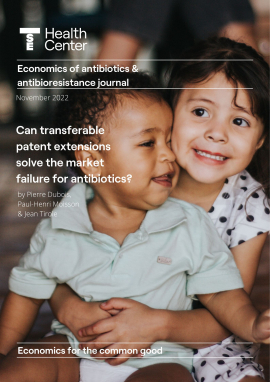Can economics save us from the antibiotic crisis?
Antibiotic resistance is a serious global public health problem and has been a growing threat since the 2000s. The costs are significant, both in terms of human lives and the financial cost of care to society. Health care systems have not been able to provide sufficient financial incentives for innovation against antimicrobial resistance. This is why, within the framework of the TSE Health Center and the ARPEGE project, TSE’s research aims to identify new economic models adapted to innovations developed in the antimicrobial resistance sector.
TSE’s Jean Tirole, Pierre Dubois, & Paul-Henri Moisson delivered their first research results recently. They propose a new mechanism for rewarding innovation, taking the form of a voucher that could be transfered to another pharmaceutical company and give it the right to extend the period of exclusivity of one of its drugs.
The following are the key findings of their research:
-
The conjunction of stewardship policies aimed at fighting antimicrobial resistance, and inadequate therapeutical value assessment has deterred R&D investment in innovative antimicrobials. Our society needs to solve the broken market incentives problem in order to avoid a future microbial pandemic.
-
The revenues of innovative antimicrobials must be delinked from the sales quantities to accommodate both stewardship and incentives for antimicrobial innovation. However, given the scale of the required R&D investments, no single country can provide strong enough incentives by itself. Unfortunately, international agreements are hard to design because of each country’s temptation to “free ride” on the others’ contributions and efforts, as the climate change global mismanagement and inaction amply demonstrates.
-
A voucher system of Transferable Exclusivity Extensions (TEE) provides an original “currency” with which to reward inventors: The inventor of an innovative drug would be given a patent extension right, and this right could be sold to an entity with an existing IP right, that would then enjoy the extra period of exclusivity after the standard patent protection expiration date.
-
Because of the uncertainty as to the vouchers’ market value, TEEs should not be awarded with a given duration, but rather with a fixed “value”. Potential voucher buyers would then bid for the lowest duration for which they are willing to pay the “value”.
-
Implemented by the European Medical Agency across its member states, a TEE scheme would not only solve the free riding problem at the European level, but also, as our empirical results suggest, may be preferable to a union-wide cash transfer (prize) in terms of social costs. The reason is that a longer exclusivity period redistributes some of the generics’ rents post-exclusivity to the original patent owner (such rents tend to be large in most countries as generics’ prices largely exceed their marginal costs). The relative desirability of TEEs with respect to cash transfers is even stronger if the in-efficiency of tax collection and the concomitant cost of raising public funds are taken into account.
Want to read more?
- Economics of Antibiotics & Antibioresistance Journal.
- Read the interview of Pierre Dubois, one of the authors of this research on the bioMérieux's blog (February 2023): English version / French version
News published in TSE Reflect March 2023 | Photo: Unsplash




